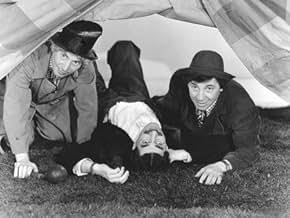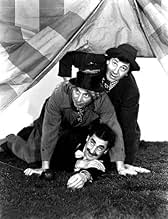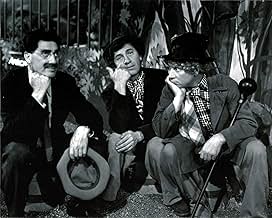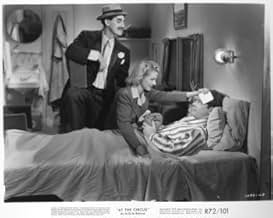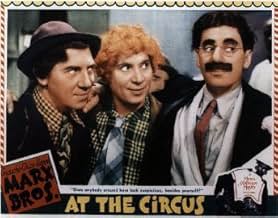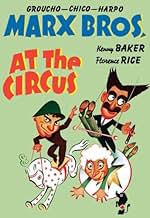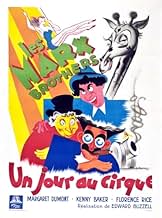NOTE IMDb
6,8/10
6,6 k
MA NOTE
Ajouter une intrigue dans votre langueThe Marx Brothers try to help the owner of a circus recover some stolen funds before he finds himself out of a job.The Marx Brothers try to help the owner of a circus recover some stolen funds before he finds himself out of a job.The Marx Brothers try to help the owner of a circus recover some stolen funds before he finds himself out of a job.
- Réalisation
- Scénario
- Casting principal
- Récompenses
- 2 victoires au total
Jerry Maren
- Little Professor Atom
- (as Jerry Marenghi)
Mariska Aldrich
- Mannish Woman
- (non crédité)
Irving Bacon
- Telegraph Clerk
- (non crédité)
Willie Best
- Redcap
- (non crédité)
John Binns
- Old Man
- (non crédité)
William A. Boardway
- Party Guest
- (non crédité)
George Bookasta
- Member of Quartette
- (non crédité)
Avis à la une
No, this isn't the Cecil B. De Mille big top opus, it's the Marx Brothers one. The boys were slowing down a bit when they made it, and as it came out in 1939, it kind of got buried under all the other movies of that remarkable film year, and is now somewhat neglected. This is a pity, for while it isn't their best movie, it's far from their worst. The plot isn't worth going into,--does anyone really want a synopsis of a Marx Brothers film?--and grande dame Margaret Dumont is on hand as the woman of Groucho's nightmares come to life. Kenny Baker and Florence Rice are the leads, and I've seen far worse. This isn't a belly laugh movie but it's very amusing. The production values are excellent, and the circus itself is fun, and so is the gorilla. Every comedian should encounter a gorilla at least once in his career. At the Circus is Groucho's chance, and it provides the movie with its funniest moment. This isn't a great comedy, but it's a very good movie.
The Marx Brothers burst onto the scene in the 1929 comedy "The Cocoanuts". Over the next few years they starred in some of the all-time classics, namely "Horse Feathers" and "Duck Soup".
Then something happened. I don't know the reason, but they left Paramount (which financed the aforementioned movies) and moved to MGM. By that point, MGM was well established as the domain of happy-go-lucky musicals, and it showed in the Marx Brothers' movies. Far from the biting satire of their earlier movies, these newer movies tended to show them performing antics in various settings: opera, horse racing, and now the circus. "At the Circus" is funny, but it's no "Duck Soup".
Ignoring all that, there's plenty of laughs to be had here (and quite a few hot babes). Enjoyable in that respect. Jerry Maren (Atom) is best known as one of the Munchkins in "The Wizard of Oz" and died only last year, making him not only the last surviving speaking cast member from TWoO, but the last surviving cast member from a Marx Brothers movie.
Then something happened. I don't know the reason, but they left Paramount (which financed the aforementioned movies) and moved to MGM. By that point, MGM was well established as the domain of happy-go-lucky musicals, and it showed in the Marx Brothers' movies. Far from the biting satire of their earlier movies, these newer movies tended to show them performing antics in various settings: opera, horse racing, and now the circus. "At the Circus" is funny, but it's no "Duck Soup".
Ignoring all that, there's plenty of laughs to be had here (and quite a few hot babes). Enjoyable in that respect. Jerry Maren (Atom) is best known as one of the Munchkins in "The Wizard of Oz" and died only last year, making him not only the last surviving speaking cast member from TWoO, but the last surviving cast member from a Marx Brothers movie.
7tavm
After 30 years, I just rewatched this latter-day Marx Brothers movie. After being loaned to RKO for Room Service, the Marxes return to M-G-M without their beloved mentor there, Irving Thalberg, having died during their last hit picture there, A Day at the Races. That movie was very enjoyable, if a little long. This one is much shorter, if not as funny. Still, there's more than enough highlights here: a couple of Chico and Groucho scenes like the "need-a-badge-to-get-on-train" and "new-cigar-needed-but-from-suspect-not-Chico", Groucho's number of "Lydia the Tattooed Lady", Harpo's number with some cool black singers mixed with his as-always touching harp solos, Chico's piano playing, and, of course, Groucho's wisecracks with Margaret Dumont, the unofficial fourth Marx brother now that Zeppo left by this time. Oh, and funny enough reunion with Nat Pendleton from Horse Feathers. Also, Fritz Feld has an amusing bit as a symphony conductor. The romantic leads of Kenny Baker, who I know from old broadcasts of radio's "The Jack Benny Program", and Florence Rice don't intrude too much so I didn't mind them or their singing. Oh, and Eve Arden was also a hoot opposite the one and only Groucho. So on that note, At the Circus is worth a look for any Marx fans out there, still.
The decline of the Marx Brothers does not begin with ROOM SERVICE, which is hysterical at it's conclusion, but with AT THE CIRCUS. Groucho always insisted that had Irving Thalberg lived his care would have made the other films in the contract after A DAY AT THE RACES as good as that and A NIGHT AT THE OPERA. This meant that the film had to be taken on the road as a Vaudeville show, and the material tested carefully. But Thalberg was dead, and Louis B. Mayer was quite unsympathetic to these three clowns who were...well clowns, and who had gotten too good a sweetheart contract from Thalburg in terms of profits. Mayer thought of comedians as interchangeable, and could not care about allowing talented ones to test their material - you hand them a script and that was that: they are paid to make it funny. If they don't you fire them.
So it is traditional to blame AT THE CIRCUS, GO WEST, and THE BIG STORE on Mayer's hostility. That hostility played a major role (there is just no denying it), but in the case of AT THE CIRCUS there is another point that is frequently overlooked. In movies by comedians, it was rare for a circus comedy to be really funny. W.C.Fields, YOU CAN'T CHEAT AN HONEST MAN was an exception - a truly funny circus comedy, but it's strength was the film record of Field's radio feud with ventriloquist dummy Charlie McCarthy. Had it been set in a movie studio or a bank or a foreign country it would have been just as successful. But other comedians were not as lucky. Charlie Chaplin worked two years on THE CIRCUS, and while a good film it was not the great film he hoped to make. The atmosphere of a circus should have been inviting to comics - after all, here clowns were really clowns. But for some reason the special needs of movie funny-men were hard to translate into the atmosphere of the big top. Possibly the best use of the big top as a comic background was in Laurel & Hardy's short film THE CHIMP. The first quarter of the film shows how they wreck the circus (which was on it's last legs anyway). But the remaining three quarters of the film deal with the boys problems with a rooming house owned by a jealous Billy Gilbert, and the title "chimp" they hope to sell to a zoo.
With the Marxes the circus just does not absorb them too much. Groucho is there, hired as a lawyer to assist Kenny Baker and his pal Chico. Harpo, as Chico's brother, is a circus roustabout. But there is little example of their involvement in the circus life of the troop or of the animals (Harpo should have been involved with circus horses, anyway). Bits of the film are actually quite good - like Chico and Harpo trying to find papers in Nat Pendleton's (the circus strongman's) room. They manage to turn it into a Christmas nightmare for poor Pendleton. And Groucho certainly has two great moments: the business of trying to get on the circus train without knowing the password (even one of the animals knows the password), and his singing "Lydia The Tattooed Lady".
There were some cuts, apparently. Groucho had a sequence where his trial skills were shown in a court presided over by Edgar Kennedy. One wishes they had kept that in the film. The poor portions, mostly tied to the sickeningly sweet and naive Kenny Baker (fighting the crooked James Burke) are overwhelming. At least Groucho was able to have another session with Margaret Dumont as Mrs. Dukesberry (Baker's aunt), and poor Margaret gets shot out of a cannon in the end. But the drab spots outnumber the good ones. Not too bad, but still just mediocre as a result.
So it is traditional to blame AT THE CIRCUS, GO WEST, and THE BIG STORE on Mayer's hostility. That hostility played a major role (there is just no denying it), but in the case of AT THE CIRCUS there is another point that is frequently overlooked. In movies by comedians, it was rare for a circus comedy to be really funny. W.C.Fields, YOU CAN'T CHEAT AN HONEST MAN was an exception - a truly funny circus comedy, but it's strength was the film record of Field's radio feud with ventriloquist dummy Charlie McCarthy. Had it been set in a movie studio or a bank or a foreign country it would have been just as successful. But other comedians were not as lucky. Charlie Chaplin worked two years on THE CIRCUS, and while a good film it was not the great film he hoped to make. The atmosphere of a circus should have been inviting to comics - after all, here clowns were really clowns. But for some reason the special needs of movie funny-men were hard to translate into the atmosphere of the big top. Possibly the best use of the big top as a comic background was in Laurel & Hardy's short film THE CHIMP. The first quarter of the film shows how they wreck the circus (which was on it's last legs anyway). But the remaining three quarters of the film deal with the boys problems with a rooming house owned by a jealous Billy Gilbert, and the title "chimp" they hope to sell to a zoo.
With the Marxes the circus just does not absorb them too much. Groucho is there, hired as a lawyer to assist Kenny Baker and his pal Chico. Harpo, as Chico's brother, is a circus roustabout. But there is little example of their involvement in the circus life of the troop or of the animals (Harpo should have been involved with circus horses, anyway). Bits of the film are actually quite good - like Chico and Harpo trying to find papers in Nat Pendleton's (the circus strongman's) room. They manage to turn it into a Christmas nightmare for poor Pendleton. And Groucho certainly has two great moments: the business of trying to get on the circus train without knowing the password (even one of the animals knows the password), and his singing "Lydia The Tattooed Lady".
There were some cuts, apparently. Groucho had a sequence where his trial skills were shown in a court presided over by Edgar Kennedy. One wishes they had kept that in the film. The poor portions, mostly tied to the sickeningly sweet and naive Kenny Baker (fighting the crooked James Burke) are overwhelming. At least Groucho was able to have another session with Margaret Dumont as Mrs. Dukesberry (Baker's aunt), and poor Margaret gets shot out of a cannon in the end. But the drab spots outnumber the good ones. Not too bad, but still just mediocre as a result.
Not one of the best Marx Bros. Movies (i.e., Duck Soup, A Day at the Races, and A Night at the Opera) but also not one of the worst either. So, solidly mid-pack. The romantic subplot involving Florence Rice's character is a total waste of time because her suitor, the singer Kenny Baker (no, not Star Wars' Kenny Baker; this movie is from 1939!), is a terrible non-actor. Harpo's musical number, surrounded by black dancers, singers, and musicians, is way above average. And the best part of this one is the supporting role played by Eve Arden as a female "daredevil" circus acrobat who is also a pickpocket and scammer. As was so often the case with any movies featuring her "2nd banana" characters, she's the best thing about any scene she is in, and that's hard to pull off when Groucho Marx is your scene partner!
Le saviez-vous
- AnecdotesFor Groucho Marx' performance of "'Lydia, the Tattooed Lady", additional lyrics were written by E.Y. Harburg exclusively for screenings of the film for Allied servicemen in European war zones. The special lyrics included the line "When she stands the world grows littler; When she sits, she sits on Hitler.' This version of the song was filmed, and included in prints of the film distributed in Great Britain and France, and was greeted with marked enthusiasm during screenings in those countries.
- GaffesDuring the "Swingali" number, three boys playing saxophones stand up and play "Auld Lang Syne," but the instruments heard on the soundtrack are clarinets.
- Citations
Peerless Pauline: I've waited so long to find someone like you.
J. Cheever Loophole: Oh, someone *like* me, I'm not good enough for you, eh?
- ConnexionsFeatured in From the Ends of the Earth (1939)
- Bandes originalesLydia, the Tattooed Lady
(1939) (uncredited)
Music by Harold Arlen
Lyrics by E.Y. Harburg
Sung by Groucho Marx and chorus, with Chico Marx at piano
Meilleurs choix
Connectez-vous pour évaluer et suivre la liste de favoris afin de recevoir des recommandations personnalisées
- How long is At the Circus?Alimenté par Alexa
Détails
- Durée1 heure 27 minutes
- Couleur
- Rapport de forme
- 1.37 : 1
Contribuer à cette page
Suggérer une modification ou ajouter du contenu manquant

Lacune principale
By what name was Un jour au cirque (1939) officially released in India in English?
Répondre

